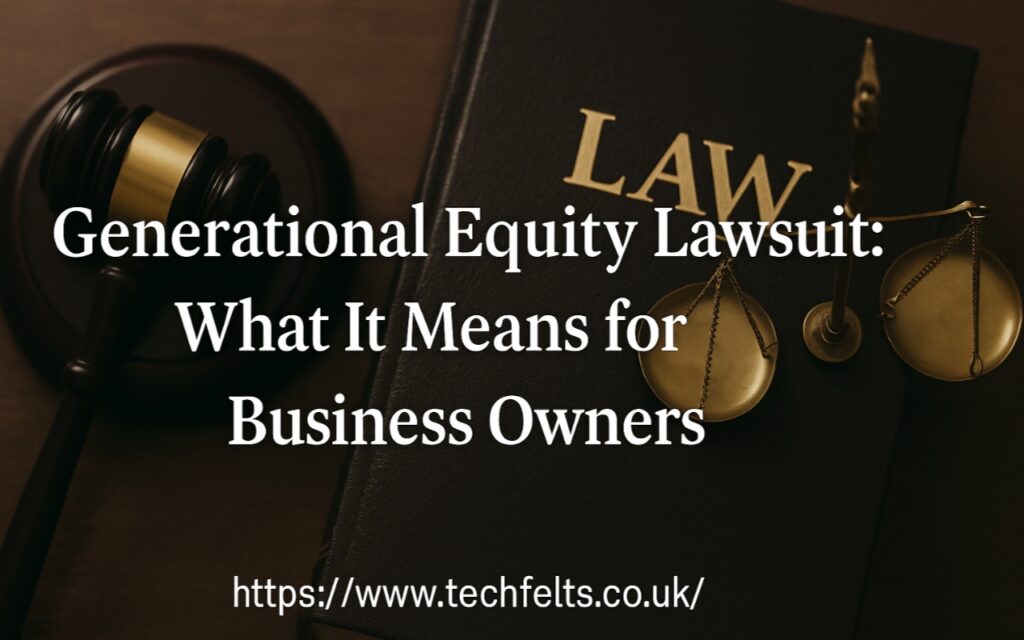Introduction: Understanding Generational Equity and the Legal Storm
Generational Equity Lawsuit is a well-known mergers and acquisitions (M&A) advisory firm that has helped thousands of privately held businesses plan and execute their exit strategies. With its primary focus on helping business owners sell their companies at maximum value, Generational Equity Lawsuit has built a solid reputation over the years. However, recent legal actions have raised serious questions about the firm’s practices, giving rise to what is now being referred to as the “Generational Equity lawsuit.”
For business owners who have engaged with or are considering working with the firm, the implications of this lawsuit could be significant. Legal proceedings involving firms like Generational Equity Lawsuit can impact not only the involved parties but also the broader landscape of M&A advisory services. In this article, we delve into the key aspects of the Generational Equity lawsuit, what the allegations are, what the lawsuit could mean for clients and the industry, and how business owners can safeguard their interests moving forward.
What Is Generational Equity and What Services Does It Provide?
Generational Equity Lawsuit specializes in helping small to mid-sized privately owned businesses transition through mergers, acquisitions, and strategic partnerships. Their core services include business valuation, exit planning, marketing to potential buyers, and guiding sellers through the transaction process. The firm operates with a large national presence, maintaining regional offices across the United States.
One of the main draws of Generational Equity Lawsuit is its promise to business owners that they can unlock the hidden value of their companies and secure the best possible exit. With over two decades of experience, the firm claims to have assisted thousands of clients in successfully selling their businesses. However, some clients have raised concerns about how these services are marketed and delivered, which plays directly into the issues highlighted in the lawsuit.
The Genesis of the Generational Equity Lawsuit
The Generational Equity lawsuit came to public attention when several former clients alleged that the firm engaged in deceptive marketing practices, misrepresented the value of their services, and charged substantial upfront fees with little to no tangible results. Some plaintiffs claim they were promised a quick and lucrative sale, only to experience delays, miscommunications, and ultimately, failed transactions.
While not all details of the case are public due to ongoing litigation, initial filings suggest that the lawsuit may center on breaches of contract, misrepresentation, and possibly violations of consumer protection laws. These claims, if proven in court, could severely damage the firm’s reputation and lead to financial penalties or enforced changes in business practices.
Key Allegations and Legal Claims Against Generational Equity
The core allegations in the Generational Equity lawsuit typically fall into several categories:
- Misrepresentation of Success Rates: Plaintiffs allege that the firm exaggerated its success rate in selling businesses to create an inflated perception of effectiveness.
- Upfront Fees Without Results: Clients claim they were required to pay substantial fees before any services were rendered, and in many cases, these fees did not lead to actual transactions.
- Inadequate Buyer Outreach: Some lawsuits suggest that Generational Equity failed to adequately market the businesses to potential buyers, leading to few or no legitimate offers.
- Overvaluation of Businesses: It’s alleged that businesses were appraised at unrealistic valuations to entice owners into signing contracts.
These allegations are serious, especially for a company whose primary value proposition lies in accurate valuation and effective transaction execution. While Generational Equity Lawsuit has denied wrongdoing, the legal scrutiny itself has prompted many current and prospective clients to reevaluate their relationships with the firm.
Impact on Current and Prospective Clients
For business owners currently working with Generational Equity, the lawsuit may create uncertainty and anxiety. Will the firm be able to fulfill its contractual obligations? Could pending deals be affected by the legal proceedings? For those considering engaging the firm’s services, the lawsuit may serve as a cautionary tale about conducting due diligence and seeking second opinions.
Clients may also find it harder to justify the costs of engagement when the firm’s practices are under legal review. The lawsuit could lead to delays in service, increased scrutiny from regulators, or even potential bankruptcy if the claims lead to substantial financial liability. Business owners are advised to consult with legal professionals to understand their rights and options in light of these developments.
Broader Implications for the M&A Industry
The Generational Equity lawsuit could have ripple effects throughout the M&A advisory sector. As one of the most prominent firms in the industry, any legal action against Generational Equity may set precedents for regulatory oversight and industry standards. Other firms may begin revising their marketing practices, transparency protocols, and fee structures to avoid similar legal entanglements.
Moreover, the lawsuit could spur more scrutiny from governmental agencies such as the Federal Trade Commission (FTC), which has shown increasing interest in consumer protection within the financial and consulting services sectors. Industry associations may also take this opportunity to reinforce best practices and ethical standards among members.
Protecting Yourself as a Business Owner
Given the high stakes involved in selling a business, it is critical for owners to protect themselves from potential exploitation. Here are some best practices:
- Conduct Independent Valuations: Before engaging any firm, consider hiring an independent appraiser to provide a second opinion on your business’s worth.
- Understand the Fee Structure: Be wary of large upfront fees. Ensure that payment schedules are tied to performance milestones or successful outcomes.
- Check References and Reviews: Look beyond testimonials. Search for unbiased client reviews and any publicly available complaints or lawsuits.
- Hire a Legal Advisor: Always have a lawyer review contracts and advise you on any clauses that may be unfavorable or difficult to enforce.
- Ask for Transparency: A reputable firm should be able to clearly explain their process, timeline, and how they source buyers.
By following these steps, business owners can reduce their risk and make more informed decisions about which advisory services to trust.
Responses and Statements from Generational Equity
Generational Equity Lawsuit has responded to the lawsuit with a strong denial of any wrongdoing. In public statements, the firm emphasizes its long-standing record of successful transactions and satisfied clients. They argue that the allegations are isolated incidents or misunderstandings and not reflective of their overall operations.
Legal representatives for the firm have stated that they intend to vigorously defend against the claims and believe the lawsuit lacks merit. The company has also highlighted testimonials and success stories from satisfied clients as evidence of its effectiveness. As the case progresses, more details are likely to emerge, potentially confirming or challenging these assertions.
Legal and Ethical Considerations in Business Brokerage
The Generational Equity lawsuit brings up important ethical and legal questions that extend beyond this particular case. For instance, how transparent should business brokers be about success rates? What constitutes fair marketing practices in the advisory space? When do aggressive sales tactics cross the line into misrepresentation?
These questions underscore the need for stricter industry regulations and stronger consumer protections. The case may lead to new legal standards for disclosure, fee structures, and contractual obligations. Ultimately, both business owners and advisory firms may need to adjust their practices to align with evolving expectations and legal requirements.
The Road Ahead: What to Watch For
As the Generational Equity lawsuit continues to unfold, business owners and industry professionals should pay close attention to several key developments:
- Court Decisions and Settlements: The outcomes of the case could set legal precedents or lead to significant financial penalties.
- Regulatory Reactions: Agencies like the FTC may increase oversight or introduce new regulations based on findings from the case.
- Industry Changes: Competing firms may revise their service models to avoid similar legal risks.
- Client Experiences: Testimonials and further complaints may surface, either strengthening or weakening the case against Generational Equity.
In the meantime, the best course of action for business owners is to stay informed, seek legal counsel when needed, and carefully evaluate any service provider involved in the sale or valuation of their business.
Conclusion: Lessons for Business Owners and the M&A Industry
The Generational Equity lawsuit serves as a stark reminder that due diligence, transparency, and ethical business practices are essential in the M&A advisory field. While the legal outcome remains uncertain, the case has already begun to influence how business owners view advisory services and how firms position themselves in the marketplace.
For those looking to sell their businesses, the key takeaway is clear: choose your advisors wisely, demand transparency, and never hesitate to ask tough questions. Whether or not Generational Equity Lawsuit is found liable, the broader conversation around ethics and accountability in business brokerage is long overdue—and necessary for a more trustworthy and effective marketplace.
Read more: Augusta Precious Metals Lawsuit: A Comprehensive Analysis for Investors



